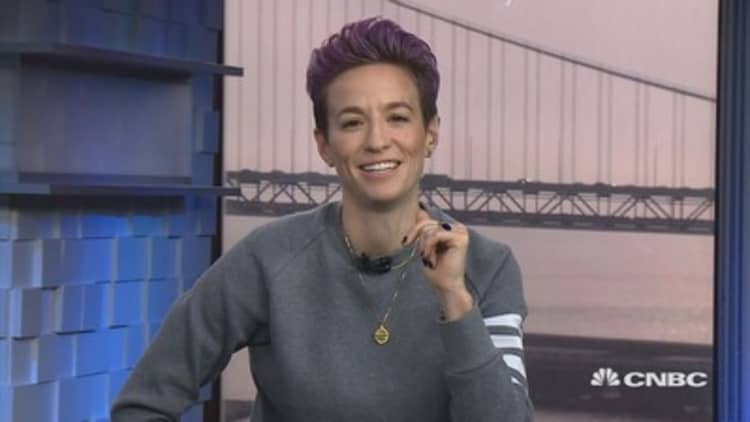Many Olympic athletes, who are going for the gold, will be going for the green when the games end.
That's why, with the 2020 Tokyo Summer Olympics just months away, a group of Visa-sponsored athletes are getting a crash course in financial literacy for life after the games.
"As much as you would like to set yourself up for success post-competition, few athletes think about it," said Kate Johnson, Visa's vice president of global sponsorship marketing.
Johnson is a former American rower and silver medalist who participated in the 2004 Olympic Games in Athens.
She began competing at age 15 and was on nine U.S. national rowing teams throughout her career. She joined Visa in 2013 after transitioning from professional athlete.
"I didn't grow up with much financial literacy."Megan RapinoeU.S. Women's National Soccer Team Co-Captain
She now works to help current athletes and those approaching retirement from sports to be financially prepared for their next phase of life.
"It's about going back to the novice mentality and being willing to try things on," Johnson said. "You can find love in your career, you just have to be willing to start from scratch."
Helping athletes on and off the field
Visa's roster of sponsored athletes for the 2020 Olympic and Paralympic Games represent 43 countries, the most in Team Visa history, with more than 70 athletes competing in more than 30 sports.
The group is offered courses on digital payments, the Japanese economic/payments ecosystem including the Japanese government's cashless mandate, and sessions on how to build a brand through social media ahead of Tokyo 2020.
Visa has also organized the Olympian & Paralympian Business Development Program — a 12- to 24-month program that provides any former Olympic or Paralympic athletes with career training, development, mentoring and networking.
The program includes working rotations in various departments at Visa, including sales, marketing and sponsorship, product, communication and strategy.
To date, Visa has invited eight Olympians and one Paralympian to be part of the program.
"The opportunity to compete on the world stage while representing our country is truly an honor," said Simone Biles, four-time Olympic gold medalist on the U.S. gymnastics team. "The encouragement and support we receive from teammates, family, friends, fans and our partners, like Visa, really means a lot as we pursue our life-long goals and dreams."
More from Invest in You:
How to make people smarter about money
Why you're not rich and what you can do to get there
Real-life con artist says never post this on social media
Olympians and Paralympians are also supported in their personal business ventures with Visa's advice, support and business development program.
What's more, Visa's senior director of social impact, Hugh Norton, provides a deep dive on practical business skills, Visa's first-ever educational portal for small-business owners.
Poppy Starr Olsen, 19, an Australian world champion skateboarder, has taken advantage of the help. Olsen is an artist and jewelry maker who leveraged her small business to fund her athletic career. Another is Megan Rapinoe, an Olympic gold medalist, two-time Women's World Cup champion, and 2019 FIFA Women's World Player of the Year. She launched a gender-neutral fashion company Re-inc.
"I didn't grow up with much financial literacy and I know there's a lot of athletes who grew up in more under-served communities or lower socioeconomic communities," said Rapinoe, the U.S. women's national soccer Team co-captain.
"Visa helps us not only in our career, but how to set up for the rest of our lives, which is going to be a much longer period," she said.
The transition from professional athlete to entrepreneur is not always a smooth one.
To that point, Swedish tennis player Bjorn Borg, who won six French Opens and five Wimbledon titles before retiring at 27, failed in his own fashion venture his first time around. He eventually found success starting an underwear company.
The dangers of a financial setback is common among athletes who lack a proper support structure.
"The thing I've learned about having a start-up is that you actually know nothing and you're learning 4000 new things a day," Rapinoe said.
She said her fashion line will continue to sell privately but as the company continues to grow she may one day be open to selling on e-retailers like Amazon.







